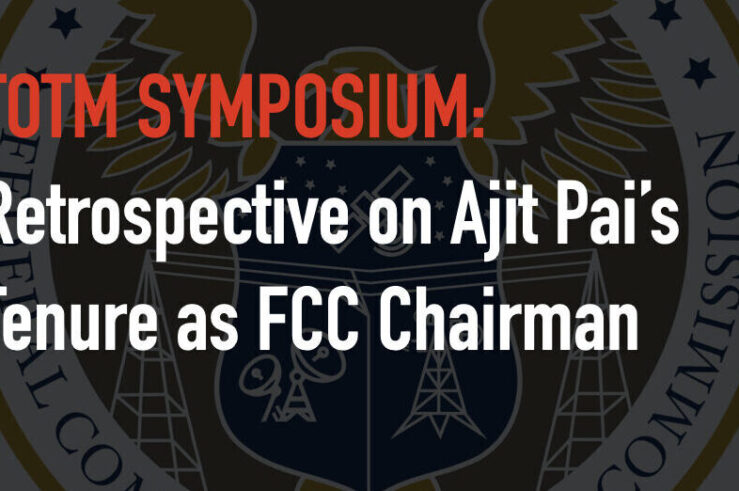Showing results for: “Michael Vita”
Why Restoring Internet Freedom Was a Landmark Accomplishment
I am pleased to participate in this retrospective symposium regarding Ajit Pai’s tenure as Federal Communications Commission chairman. I have been closely involved in communications law and policy for nearly 45 years, and, as I’ve said several times since Chairman Pai announced his departure, he will leave as one of the most consequential leaders in ... Why Restoring Internet Freedom Was a Landmark Accomplishment
The Antitrust Prohibition of Favoritism, or the Imposition of Corporate Selflessness
It is my endeavor to scrutinize the questionable assessment articulated against default settings in the U.S. Justice Department’s lawsuit against Google. Default, I will argue, is no antitrust fault. Default in the Google case drastically differs from default referred to in the Microsoft case. In Part I, I argue the comparison is odious. Furthermore, in ... The Antitrust Prohibition of Favoritism, or the Imposition of Corporate Selflessness
Conflict of Interest in Prosecuting Police Officers: Examining the Incentives Facing District Attorneys
High-profile cases like those of Michael Brown in Ferguson, Missouri, and Breonna Taylor in Louisville, Kentucky, have garnered attention from the media and the academy alike about decisions by grand juries not to charge police officers with homicide. While much of this focus centers on alleged racial bias on the part of police officers and ... Conflict of Interest in Prosecuting Police Officers: Examining the Incentives Facing District Attorneys
Big Tech but Bigger Ideas
As an academic working at the intersection of economics, law, and innovation, I was excited to see Nicolas Petit apply an interdisciplinary approach to investigate big tech in the digital economy. Working across law, business, and engineering has taught me the importance of bringing together different theoretical perspectives and mindsets to address complex issues. [RL1] Below ... Big Tech but Bigger Ideas
The Myth of the Cyber Barons
During last week’s antitrust hearing, Representative Jamie Raskin (D-Md.) provided a sound bite that served as a salvo: “In the 19th century we had the robber barons, in the 21st century we get the cyber barons.” But with sound bites, much like bumper stickers, there’s no room for nuance or scrutiny. The news media has ... The Myth of the Cyber Barons
Would You Rather: Merger or Nationalization?
While much of the world of competition policy has focused on mergers in the COVID-19 era. Some observers see mergers as one way of saving distressed but valuable firms. Others have called for a merger moratorium out of fear that more mergers will lead to increased concentration and market power. In the meantime, there has ... Would You Rather: Merger or Nationalization?
The Negative Externalities of Protecting Privacy
The public policy community’s infatuation with digital privacy has grown by leaps and bounds since the enactment of GDPR and the CCPA, but COVID-19 may leave the most enduring mark on the actual direction that privacy policy takes. As the pandemic and associated lockdowns first began, there were interesting discussions cropping up about the inevitable ... The Negative Externalities of Protecting Privacy
There Aren’t Luddites in a Quarantine
Nellie Bowles, a longtime critic of tech, recently had a change of heart about tech, which she relayed in the New York Times: Before the coronavirus, there was something I used to worry about. It was called screen time. Perhaps you remember it. I thought about it. I wrote about it. A lot. I would ... There Aren’t Luddites in a Quarantine
Privacy in the Time of Covid-19
I type these words while subject to a stay-at-home order issued by West Virginia Governor James C. Justice II. “To preserve public health and safety, and to ensure the healthcare system in West Virginia is capable of serving all citizens in need,” I am permitted to leave my home only for a limited and precisely ... Privacy in the Time of Covid-19
Policy Diversity Saves Lives: Unmasking Confirmation Bias Caused by a Virus
The brutal toll of the coronavirus pandemic has delivered dramatic public policies. The United States has closed institutions, banned crowds, postponed non-emergency medical procedures and instituted social distancing. All to “flatten the curve” of illness. The measures are expensive, but there is no obvious way to better save lives. There is evidence that, even without ... Policy Diversity Saves Lives: Unmasking Confirmation Bias Caused by a Virus
COVID-19 Exposes the Shallowness of Our Privacy Theories
The importance of testing and contact tracing to slow the spread of the novel coronavirus and resume normal life is now well established. The difference between the communities that do it and the ones that don’t is disturbingly grim (see, e.g., South Korea versus Italy). In a large population like the U.S., contact tracing and ... COVID-19 Exposes the Shallowness of Our Privacy Theories
More Corona Testing Is Necessary, But Not Sufficient, To Get Us Back on Our Feet. Verification of Good Health Is Also Required
In these harrowing times, it is a natural to fixate on the problem of testing—and how the United States got so far behind South Korea on this front—as a means to arrest the spread of Coronavirus. Under this remedy, once testing becomes ubiquitous, the government could track and isolate everyone who has been in recent ... More Corona Testing Is Necessary, But Not Sufficient, To Get Us Back on Our Feet. Verification of Good Health Is Also Required








